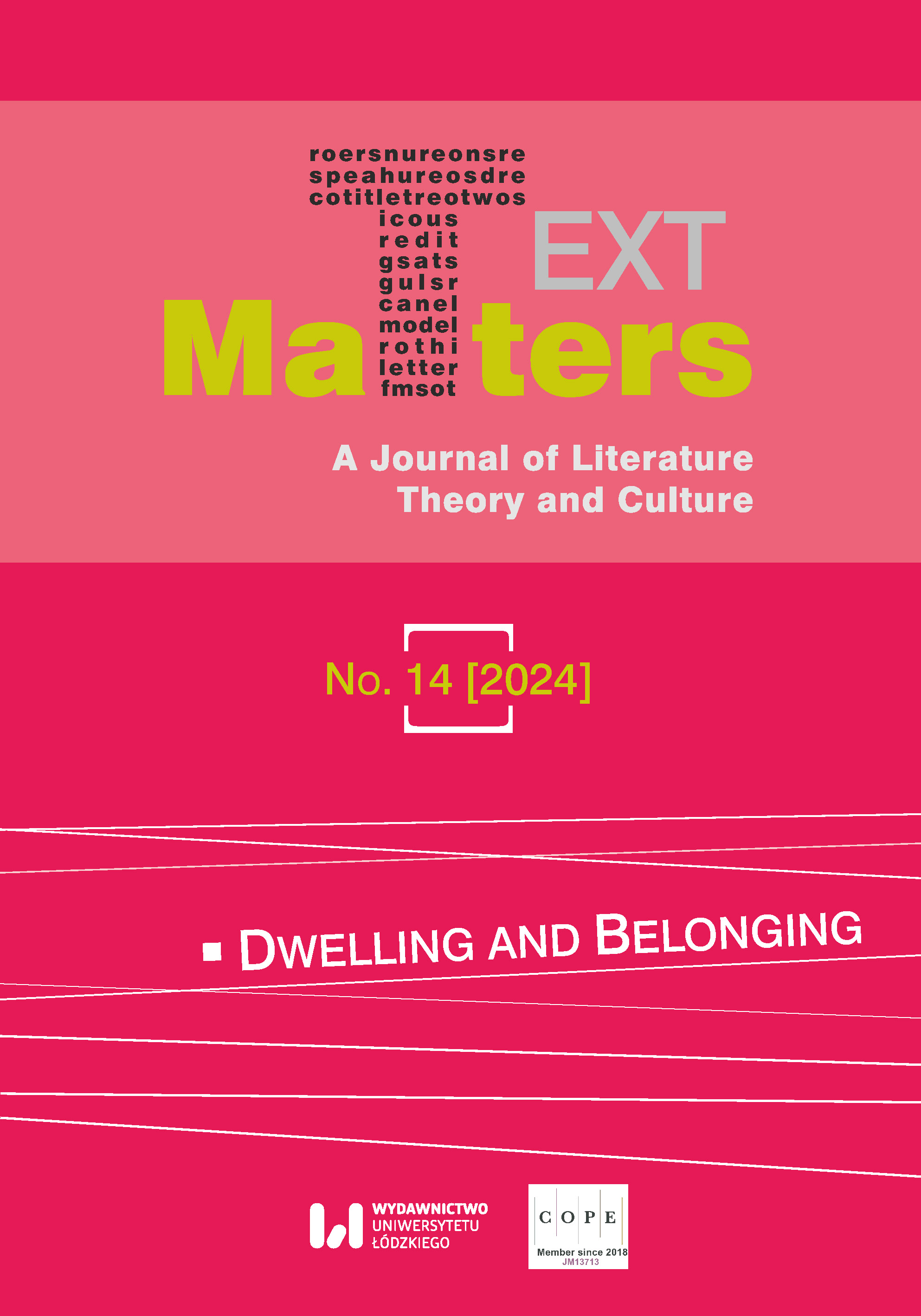How to Dwell in Garbage Patches? Waste Communities in the Aftermath of Ancestral Catastrophe in Chen Qiufan’s The Waste Tide (2013) and Wu Ming-yi’s The Man with the Compound Eyes (2011)
DOI:
https://doi.org/10.18778/2083-2931.14.10Keywords:
waste, garbage patch, ancestral catastrophe, collective memory, poetic dwellingAbstract
The article approaches the problem of dwelling in areas affected by environmental crises through the lens of two speculative fabulations. Chen Qiufan’s The Waste Tide (2013) and Wu Ming-yi’s The Man with the Compound Eyes (2011) both depict the intrusion of human-induced catastrophes into the life of coastline communities in Southeast Asia, requiring them to work out forms of dwelling and remembering that make space for the assemblages of beings that emerge out of the devastated landscapes inherited after the modern era. Each of the novels tackles a different aspect of this problem. The Waste Tide shows the catastrophic effects of mass production and recycling of electronic garbage which, shipped to junkyards in the Global South, not only exacerbates the environmental pollution, but also exerts a negative impact on the local indigenous and migrant communities, threatening their economic status and social cohesion. Inspired by Martin Heidegger’s meditations on poetic dwelling, The Man with the Compound Eyes features the so-called Great Pacific Garbage Patch, a gigantic collection of plastic waste gathering on the surface of the ocean and hitting coastal regions, wreaking havoc on local life. By investigating the two novels, I look for models of remembering and dwelling together that go beyond the anthropocentric notion of memory rooted in an individual self and offer new models of dwelling in times of catastrophe.
Downloads
References
Chakrabarty, Dipesh. One Planet, Many Worlds: The Climate Parallax. U of Chicago P, 2023. https://doi.org/10.2307/jj.1204248
Google Scholar
DOI: https://doi.org/10.2307/jj.1204248
Chen, Qiufan. The Waste Tide. 2013. Translated by Ken Liu, Tor, 2019. E-book.
Google Scholar
Clark, Nigel, and Kathryn Yusoff. “Geosocial Formations and the Anthropocene.” Theory, Culture & Society, vol. 34, no. 2–3, 2017, pp. 3–23. https://doi.org/10.1177/0263276416688946
Google Scholar
DOI: https://doi.org/10.1177/0263276416688946
Foltz, Bruce V. Inhabiting the Earth: Heidegger, Environmental Ethics, and the Metaphysics of Nature. Humanity, 1995.
Google Scholar
Ghosh, Amitav. The Great Derangement. Climate Change and the Unthinkable. Penguin, 2016. https://doi.org/10.7208/chicago/9780226323176.001.0001
Google Scholar
DOI: https://doi.org/10.7208/chicago/9780226323176.001.0001
Healey, Cara. “Estranging Realism in Chinese Science Fiction: Hybridity and Environmentalism in Chen Qiufan’s The Waste Tide.” Modern Chinese Literature and Culture, vol. 29, no. 2, 2017, pp. 1–33.
Google Scholar
Heidegger, Martin. “Building, Dwelling, Thinking.” Poetry, Language, Thought, translated by Albert Hofstadter, Harper Perennial, 2001, pp. 141–59.
Google Scholar
Heidegger, Martin. “. . . Poetically Man Dwells . . .” Poetry, Language, Thought, translated by Albert Hofstadter, Harper Perennial, 2001, pp. 209–27.
Google Scholar
Heidegger, Martin. “What Are Poets For?” Poetry, Language, Thought, translated by Albert Hofstadter, Harper Perennial, 2001, pp. 87–140.
Google Scholar
Karamercan, Onur. “Could Humans Dwell beyond the Earth? Thinking with Heidegger on Space Colonization and the Topology of Technology.” Interdisciplinary Studies in Literature and Environment, vol. 29, no. 3, 2020, pp. 1–26. https://doi.org/10.1093/isle/isaa164
Google Scholar
DOI: https://doi.org/10.1093/isle/isaa164
Little, Peter C. Burning Matters: Life, Labor, and E-Waste Pyropolitics in Ghana. Oxford UP, 2021.
Google Scholar
DOI: https://doi.org/10.1093/oso/9780190934545.001.0001
Nixon, Rob. Slow Violence and the Environmentalism of the Poor. Harvard UP, 2011. https://doi.org/10.4159/harvard.9780674061194
Google Scholar
DOI: https://doi.org/10.4159/harvard.9780674061194
Povinelli, Elizabeth A. Between Gaia and Ground: Four Axioms of Existence and the Ancestral Catastrophe of Late Liberalism. Duke UP, 2021.
Google Scholar
DOI: https://doi.org/10.1215/9781478021872
Rentmeester, Casey. Heidegger and the Environment. Rowman & Littlefield, 2018.
Google Scholar
Scarano, Alessandro. “Chen Qiufan: ‘Waste is Changing our Society and Living.’” Domus, 17 May 2019, https://www.domusweb.it/en/opinion/2019/05/17/chen-qiufan-waste-is-changing-our-society-and-living.html accessed 29 Sept. 2023.
Google Scholar
Stengers, Isabelle. In Catastrophic Times: Resisting the Coming Barbarism. Translated by Andrew Goffey, Open Humanities, 2015.
Google Scholar
Sterk, Darryl. “The Apotheosis of Montage: The Videomosaic Gaze of The Man with the Compound Eyes as Postmodern Ecological Sublime.” Modern Chinese Literature and Culture, vol. 28, no. 2, 2016, pp. 183–222.
Google Scholar
Tsai, Robin Cheng. “Speculating Extinctions: Eco-Accidents, Solastalgia, and Object Lessons in Wu Ming-yi’s The Man with the Compound Eyes.” Comparative Literature Studies, vol. 55, no. 4, 2018, pp. 864–76. https://doi.org/10.5325/complitstudies.55.4.0864
Google Scholar
DOI: https://doi.org/10.5325/complitstudies.55.4.0864
Wu, Ming-yi. The Man with the Compound Eyes. 2011. Translated by Darryl Sterk, Vintage, 2015. E-book.
Google Scholar
Yusoff, Kathryn. “Indeterminate Subjects, Irreducible Worlds.” Body & Society, vol. 23, no. 3, 2017, pp. 75–101. https://doi.org/10.1177/1357034X17716746
Google Scholar
DOI: https://doi.org/10.1177/1357034X17716746
Published
Versions
- 2024-11-28 (2)
- 2024-11-28 (1)
How to Cite
Issue
Section
License

This work is licensed under a Creative Commons Attribution-NonCommercial-NoDerivatives 4.0 International License.
Funding data
-
Narodowe Centrum Nauki
Grant numbers UMO-2021/43/B/HS2/01580













